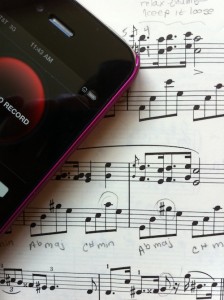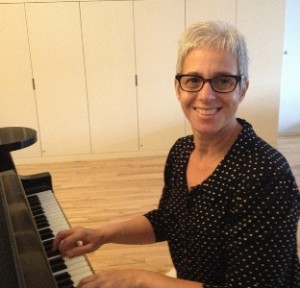For many years, I regarded my adult piano lessons as showtime. Of course my teacher and I worked through the material, but I saw the lesson primarily as a chance to perform work I had accomplished the week before. Recently, after an uncomfortable lesson with my new teacher, I discovered a radically different perspective: the lesson as turbocharged piano practice.
My revelation began with a Scriabin Etude, Opus 2, No. 1. I found the music enchantingly sad, but the second page had so many double flats and flatted grace notes that my eyes were bulging out. So I procrastinated.
At my lesson, I told my teacher, Mark, that I hadn’t found the time to get to the second page. A week later, I gave him a variation on the same excuse. This turned out to be one moment in adult piano lessons when variations were not welcome.
Mark cleared his throat. “We’re going to learn this now. Let’s start right here.” He pointed to the first of the two offending measures.
I tried to parry for time. I pointed to a teeny-tiny grace note that had a flat sign in front of it. “Is this a C flat?”
“Yes, it is,” he said. “Let’s begin.”
While I lumbered through the music, I peered at the score and scratched my head, but Mark waited patiently. A couple of minutes seemed to elapse while I fitted my left hand across an unlikely chord that was vintage Scriabin: E flat, G, and D flat. Mark did not seem to care how long I took to strike the next chord, as long as it was correct. “You have to remember you are downloading the music to your brain,” he said.
By the time I finished the two measures, 15 minutes had gone by. I was covered in a palimpsest of sweat. Deep inside, I worried that once Mark discovered how slowly I learned music, he no longer would want to teach me. My logical side knew why I teetered with insecurity. During my adolescence, neither of my parents had supported my piano practice and I stopped studying at age 16, not to reclaim the piano for 25 years. Perhaps in a sense I feared I losing the piano again.
When I posted my experience about practicing during my lesson to my Facebook piano page, I expected commiseration. Something along the lines of what a friend might have said to me in front of my high school locker, “Oh, my GAWD, I would have been so embarrassed.” Even the more updated, “I know, RIGHT?” usually uttered in a tone of understanding mirth, would have been welcomed.
First off came a diplomatic comment from Harriet Kaplan, a professional cellist who now is studying the piano with Matthew Harre. “Sometimes it’s better to practice it first with your teacher so you don’t spend a week or more practicing it wrong!” she counseled. Well, that was fine for Harriet to be so mature, I thought. Her credentials would give anyone confidence.
Trevor Perry, an advanced beginner student, weighed in. “I’ve been learning how to play Eine kleine Nachtmusik for well over a month. And if my piano teacher isn’t happy he makes me learn it there and then.” Trevor’s sangfroid must be unusual, especially for a newer student, I told myself. Most likely, he and Harriet were in the minority.
“I agree,” wrote Robin Sloane Seibert. I sighed but read on. “I actually like playing the music with my teacher. I feel as if she is holding my hand so I can avoid making mistakes later on.” Robin, a Contributing Editor at GRAND PIANO PASSION™, was one of those people who embraced learning—she was also studying piano music theory—so perhaps that made her more open to exposing her deficiencies to her teacher.
By the time I read Carol Dales’s comment, I was out of excuses. “Yep, that’s what my teacher does too. If I’ve been avoiding something or just plain show her I can’t play it properly, we practice together (with me counting aloud—yikes!) It feels humiliating at first and I can’t say I enjoy it, BUT… it works. My husband’s guitar teacher does it too.”
That little addition of the guitar teacher emulating all those piano teachers who insisted on piano practice during the lesson caused the final post in my defenses to crumble. I wanted to arrange the outcome of my piano lesson, for praise, and in a sense, permission to play. Despite my passion for classical piano music, I still was not sure whether I deserved to be studying the piano.
I am a pianist, I told myself. I take piano lessons, and an important part of lessons is practicing with my teacher.





I agree absolutely and had the same feelings of insecurity, too, for many years. My current teacher, whom I started 2 and a half years ago also has me practice during lessons and asks me how I will practice at home. Lesson time is practice time, to go over the mistakes and correct them and practice developing the skills to play it correctly so I don’t waste time during the week practicing it the wrong way. I am making more progress now with this method than with any of my previous teachers.
Janice Rosen
Janice, thank you for this instructive comment, and great to hear that you are making so much progress with your new teacher. Nancy
I can remember going through a similar experience with my classical guitar teacher. I remember feeling mortified to feel exposed that it appeared that I was not as advanced as I had hoped to be. I felt like that moment when Toto exposed the real Wizard behind the curtain and him saying, “pay no attention to that man behind the curtain!”. Inside I was saying, “pay no attention to the student who cannot play this piece! The real student can play it perfectly.” My teacher would have none of this. I even tried to fiddle with my hearing aid and he gave me no sympathy, “there is nothing wrong with your hearing!” he said. Ok so he was a bit extreme and I was way shy on top of it.
Years past though and I had a new teacher and I felt the same old feelings of not wanting to be vulnerable and exposed. He so gently gave me tips on how to improve my playing of the piece that it hit me, “oh, my teacher is my friend! he is someone who helps me improve.” For years I was afraid of teachers since my hearing loss at times caused misunderstandings and embarrassment and I always thought they were secretly trying to out me for being inadequate.
I realized that my teacher had to see my faults and weaknesses in order to help me and it was great for me to feel good about it instead of embarrassed. It took me years to get there though!
Your post brought back all of that for me. Thanks.
Blue, I loved reading about your journey, especially about how we have to let our teachers see our faults and weaknesses–very helpful.
The other part of this is that a good teacher is also teaching you HOW to practice, so that’s another very good reason to practice in your lesson. (But I have suffered the flop sweat during the experience as well!) My worst experience with this was when I played the Haydn D major cello concerto at a master class for a very famous cellist. I was totally unprepared to perform it, and in fact my teacher didn’t really encourage me to do the class, but I wanted to play so went ahead. I played the opening of the piece, and the guy stopped me and asked, “How do you practice this?” I said something brilliant, like, “I dunno” (note that this was on a stage in front of an audience of college-and-above cellists). So he said, “I want you to practice this for 5 minutes right now,” and actually took out his watch. All I remember about the rest of it was that I fumbled around embarrassingly for a few minutes, and he stopped me again and told me I was doing it all wrong. He never did explain how I should have been practicing the piece, so I didn’t actually learn anything except that the guy was a jerk. Although he probably was correct that I needed to practice differently, his method here wasn’t helpful. In contrast, practicing in front of your sympathetic teacher in the privacy of his or her studio is a piece of cake.
Harriet, having to practice at a master class does take the cake (to continue our cake metaphor)! Seriously, that must have been tough, and he should have at least given you some pointers after you sweated through it.
“Rubinstein said in his first volume of memoirs, ”My Young Years”, his musical accomplishments remarkable by any standard, (though practicing little in his early years, he sometimes would perform a piece in public that >> he had learned hours before by glancing at the score during a train ride).” #inspiration 😉